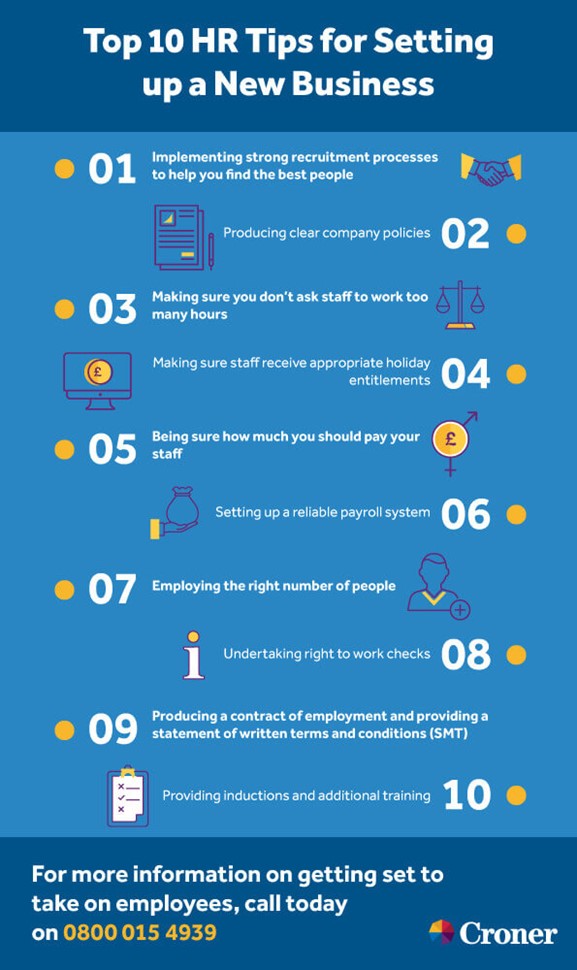Setting up a new business is a challenging and exciting time. You undoubtedly have a lot to think about, and it can make managing your staff seem like a secondary concern. But it shouldn’t be. Below are top tips you should be thinking about.
Top 10 HR Tips

1. Implementing strong recruitment processes to help you find the best people.
Ensure you get the right people for your business by carefully constructing job adverts. Outline what the position will involve and how much experience the candidate should have.
Also be careful not to be discriminatory – it’s not as simple as it sounds. For example, asking for a recent graduate may indirectly discriminate against older individuals. It is advisable to try and have a diverse interview panel that can provide varied opinions when making hiring decisions.
2. Producing clear company policies.
Policies and procedures play a very important role in providing guidance to employees. They help staff understand what you expect of them.
A strong policy can assist you in avoiding disputes further down the line as you will be able to argue that the behaviour or conduct expected from an employee is clearly outlined. It can also reaffirm a company’s commitment to working against forms of workplace discrimination. This includes anti-bullying and harassment policies, which are highly attractive to external candidates.
3. Making sure you don’t ask staff to work too many hours.
The hours you will expect your staff to work will depend upon your business. However, you should remember that the law strictly instructs that adult workers cannot work more than 48 hours per week on average unless they sign an opt out agreement.
Also remember that they are entitled to a minimum rest period of 11 consecutive hours in each 24-hour period. If you intend to hire young workers remember that individuals under the age of 18 are not usually permitted to work more than eight hours a day or 40 hours per week.
4. Making sure staff receive appropriate holiday entitlements.
When considering holiday allowance remember that almost all workers are legally entitled to 5.6 weeks’ paid holiday per leave year. This can include bank holidays but there is not stand alone entitlement to take bank holidays off. You can always give more than the minimum if you choose to, however you should fully consider the demands of your business.
5. Being sure how much you should pay your staff.
The pay that you will provide to your workforce will be based on a number of factors, such as the experience or qualifications you expect them to have. You should however bear in mind that you cannot legally pay them below the current national minimum wage rates, which change every April.
Failure to provide at least the minimum wage can lead to a fine from the HMRC alongside being publicly named and shamed. Bad news for a company just starting out.
6. Setting up a reliable payroll system.
Your employees will expect to be paid on time and you should have a system in place that will make sure this happens.
It is illegal for unauthorised deductions to be made from an employee’s wage and the affected staff member can make a complaint to an employment tribunal if this situation is not rectified quickly. You can invest in software that will help you with this alongside managing other HR related requests, such as holidays.
7. Employing the right number of people.
This may sound obvious but many companies can fall into the trap of not hiring enough people to do the job, meaning that the employees they do have need to work longer hours in order to keep up with the workload.
This can increase the level of stress upon a workforce, cause them to become less productive and potentially lead to them seeking employment elsewhere. Remember that having to continuously replace staff members can be a very costly and time consuming exercise.
You should consider how many people your company will need to function properly and be prepared to revaluate this going forward.
8. Undertaking right to work checks.
If you intend to employ individuals from overseas, you need to make sure that they are legally able to live and work in the UK.
You can either check an applicant’s right to work in person or on the government website, provided they have given you their share code. If you are caught employing an illegal worker you can face a fine of up to £20,000 even if you were not aware of it.
9. Producing a contract of employment and providing a statement of written terms and conditions (SMT).
When taking on a new employee, a contract of employment will exist between yourself and them.
Not all contracts of employment have to be in writing for them to be legal. But, you do have to provide a written statement of terms and conditions within two months of the commencement of employment. This needs to detail the main terms and conditions of employment, such as the start date, holiday entitlements and notice periods required to terminate the employment.
10. Providing inductions and additional training.
Consider what training you are going to need to provide to your staff when they start their jobs. Is there any specific software they may need more information on or processes they will need to get used to?
Inductions can also be a useful way of reaffirming company policies to members of staff, informing them of general health and safety procedures and reiterating the consequences of misconduct.
Need further assistance?
Still have queries about setting up your HR systems? Speak to a Croner expert and get comprehensive and personalised advice if and when you need it. Call today on 01455 858 132.
Related resources
Categories
- Business Advice
- Contracts & Documentation
- Culture & Performance
- Disciplinary & Grievances
- Dismissals & Conduct
- Employee Conduct
- Employment Law
- End of Contract
- Equality & Discrimination
- Health & Safety
- Hiring & Managing
- Leave & Absence
- Managing Health & Safety
- Moving
- Occupational Health
- Pay & Benefits
- Recruitment
- Risk & Welfare



